Unit 7
人教版七年级英语下册unit7(详细内容)
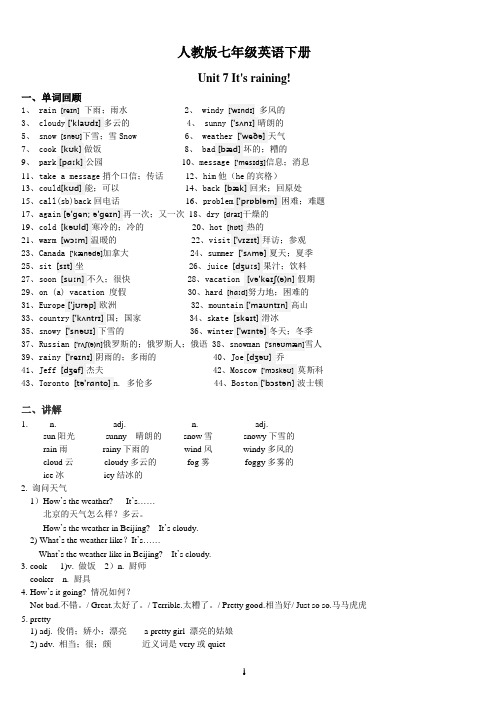
人教版七年级英语下册Unit 7 It's raining!一、单词回顾1、 rain [reɪn]下雨;雨水2、 windy ['wɪndɪ]多风的3、 cloudy['klaʊdɪ]多云的4、 sunny ['sʌnɪ]晴朗的5、 snow [snəʊ]下雪;雪Snow6、 weather ['weðə]天气7、cook [kʊk]做饭8、bad[bæd]坏的;糟的9、park[pɑːk]公园10、message ['mesɪdʒ]信息;消息11、take a message捎个口信;传话12、him他(he的宾格)13、could[kʊd]能;可以14、back [bæk]回来;回原处15、call(sb)back回电话16、problem['prɒbləm] 困难;难题17、again[ə'gen; ə'geɪn]再一次;又一次18、dry [draɪ]干燥的19、cold [kəʊld]寒冷的;冷的20、hot [hɒt] 热的21、warm [wɔːm]温暖的22、visit['vɪzɪt]拜访;参观23、Canada ['kænədə]加拿大 24、summer ['sʌmə]夏天;夏季25、sit [sɪt]坐 26、juice [dʒuːs]果汁;饮料27、soon [suːn]不久;很快 28、vacation [və'keɪʃ(ə)n]假期29、on (a) vacation 度假 30、hard [hɑːd]努力地;困难的31、Europe['jʊrəp]欧洲 32、mountain['maʊntɪn]高山33、country['kʌntrɪ]国;国家 34、skate [skeɪt]滑冰35、snowy ['snəʊɪ]下雪的 36、winter['wɪntə]冬天;冬季37、Russian ['rʌʃ(ə)n]俄罗斯的;俄罗斯人;俄语 38、snowman ['snəʊmæn]雪人39、rainy ['reɪnɪ]阴雨的;多雨的 40、Joe[dʒəʊ] 乔41、Jeff [dʒef]杰夫 42、Moscow ['mɔskəʊ] 莫斯科43、Toronto [tə'rɑnto]n. 多伦多 44、Boston['bɔstən]波士顿二、讲解1. n. adj. n. adj.sun阳光sunny 晴朗的snow雪snowy下雪的rain雨rainy下雨的wind风windy多风的cloud云cloudy多云的fog雾foggy多雾的ice冰icy结冰的2. 询问天气1)How’s the weather? It’s……北京的天气怎么样?多云。
英语七年级上Unit7

thirteen fourteen fifteen
thirty forty fifty
twenty-nine thirty-nine
twenty-one … thirty-one …
one hundred
one hundred and one
1. 基数词的表达 1) one到twelve, 拼写和读音无规律可言, 只能逐一 记忆。 2) thirteen到nineteen,表示“十几”,在个位数 后加后缀-teen,其中要注意thirteen, fifteen和 eighteen的拼写。 3) twenty到ninety,表示“几十”,以ty结尾, 但需注意twenty, thirty, forty, fifty, eighty的拼写。 4) 21~29 直到91~99,表示“几十几”,用整十位 数加个位表示, 中间用连字符“-” 把十位和个位 连接起来。
• • • • • • • • • • •
将下列短语译成英语 in all colors 1.各种颜色的________ bags for sports 2.运动包 ___________ for oneself 3.亲自___________ have a look 4.看一看 ___________ on sale 5.出售___________ at a good price 6.价格合理 ___________ clothing store/shop 7.服装店___________ get to 8.到达 ___________ like…cheap 9.愿意……便宜___________ That’s not all. 10.不只这些 __________
A:您要买点什么吗? I’ll take it. 我买下了。
Unit7笔记

Section A1.询问价格1)How much is+单数名词/不可数名词? 回答:It’s +价格(钱).eg:How much is your new schoolbag? It’s 30 yuan.2)How much are +复数名词? 回答:They’re+价格(钱).eg:How much are these rulers? They are 10 yuan.3)What’s the price of +商品?It’s +钱eg:What’s the price of the book? It’s 5 dollars.2.how many/how much多少询问数量how many+可数名词复数,how much+不可数名词1)你有多少个苹果?How many apples do you have?2)你想要多少水? How much water do you want?3.socks 袜子,shoes鞋子,pants裤子,trousers裤子、gloves手套、shorts短裤、glasses眼镜等都是成双成对的物品,一般以复数形式出现,作主语时谓语动词用复数形式。
但它们和a pair of ()pair在数上一致。
:are/is这条裤子是Tom的。
eg:The pair of pants (are/is) Tom's.这条裤子是Tom的。
eg:Two pairs of pants (are4.西方国家的货币单位像dollar(美分)、yuan)、角()、分(fenis△2 dollars=$2 dollar 放在数词后,$放在数词前5.short 短的;矮的 adj. 放在连系动词后作表语,放在名词前作定语eg:The river isn’t short;it’s very long. 这条河不短;它很长。
eg:I want a short ruler.我想要一把短尺6.woman可数名词,女子【复】womenman可数名词,男子【复】men【拓】woman和man 作定语修饰可数名词复数时,其本身也要用复数形式,即women和men。
人教版九年级英语上册课件:Unit 7单元知识归纳(共12张PPT)

• 7.stop doing sth.停止做某事 • stop to do sth.停下来去做某事 • 8.be excited about对……感到兴奋 • 9.paintings by Picasso毕加索的画作 • 10.the art museum艺术博物馆 • 11.take lots of photos拍了许多照片 • 12.allow doing sth.允许做某事 • be allowed to do sth.被允许做某事
机状态
• Ⅲ.经典句型 • 1.No way!没门儿!
• 2.I don’t think sixteen-year-olds should be allowed to drive.
• 我认为十六岁的孩子不应该被允许开 车。
• 3.Me,too.我也是。
• 4.When I was tired and hungry,she gave me food and warm arms to sleep in.
• 但是当父母年迈时,年轻人到时就应该 照顾他们了。
• 7.Only then will I have a chance to achieve my dream.只有那时我将有机 会圆梦。
• 8.No matter how many difficulties we have...
• ……不管我们有多少困难……
• 当我累了,饿了时,她给我吃的,给我 休憩的温暖怀抱。
• 5.Teenagers are too young to make their own decisions.青少年太小不能作 出他们自己的决定。
• 6.But the young should then look after their parents as they get older.
人教版七年级英语上册Unit7课件

ten eleven twelve thirteen fourteen fifteen
sixteen seventeen eighteen nineteen
twenty twenty-one twenty-two twenty-nine
thirty thirty-one thirty-five thirty-eight
$3
A: How much are these red socks? B: They’re 3 dollars.
$9
$30
$20
$22 $10
$35
$18
$3
$12
Complete the dialogue : A:Can I _____you? help want sweater. B:Yes,please.I______a A:What_______do you want? color B:Black. don’t A:Sorry,we___have any black sweaters. are Look ____the sweaters.They____very at nice,too. How much is it? A:35 dollars. B:__________ B:Ok,I’ll take it. A:Here you _____. are welcome B:Thank you! A:You’re_______.
Exercises: 汉翻英: 11个足球 14个西红柿 23件衬衫
eleven soccer balls
fourteen tomatoes twenty-three shirts twenty-eight red socks. thirty-five hats thirty-three ping-pong bats forty-five pants forty-eight sweaters fifty-seven students fifty-five clocks
人教版新目标英语九年级全册Unit 7
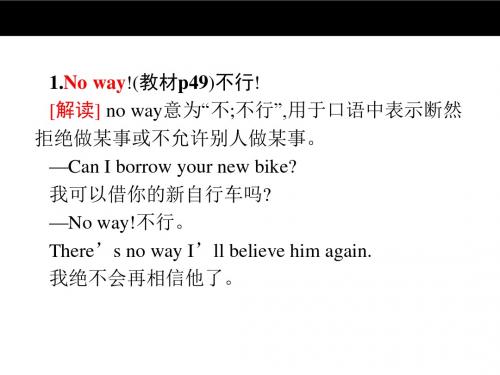
[解读3] get their ears pierced 此处get用作使役动词,意为“使,让”为 “get/have+sth.+过去分词”结构,表示“叫/让/请别 人做某事”,其中过去分词表示的动作往往是别 人做的,与句子的主语无关。 eg: I got my car repaired. When are you going to get your hair cut? My bike is broken. I’ll get/have it repaired. 我的自行车坏了,我要让人修理一下。
[解读2] allow sb to do sth 允许某人做某事 eg. The teacher allowed him to go into the classroom.
allow doing sth 允许做某事 eg. We don't allow smoking in public.
be allowed to do sth 被允许做某事 eg. Passengers are not allowed to smoke. 例1:Do you think thirteen-year-olds should be allowed to take part-time jobs? 你认为应该允许13岁的孩子们做兼职工作吗? 例2: Anna is allowed to choose her own clothes. 安娜可以选择自己的衣服。
4.When I was a tiny baby crying all night, my mom sang to me and stayed by my side.(教材P51) 当我还是一个整夜哭闹的小宝 宝时,妈妈会给我唱歌,陪伴在我身旁。
[解读1] crying all night是动词-ing形式短语,在名词 baby后作后置定语,起修饰名词的作用。 Do you know the young man waiting outside the school gate? 你认识在校门外等待的年轻人吗? [解读2] stay by one’s side意为“在某人身边(给予照 顾或支持)”,相当于be at one’s side。 Don’t worry. I will always be at your side. 不要担心,我会一直在你身边。
七年级上册单词表:unit7
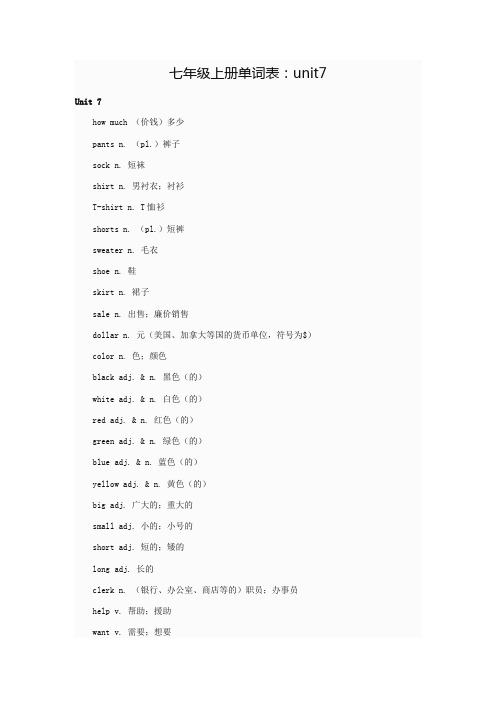
long adj.长的
clerk n.(银行、办公室、商店等的)职员;办事员
help v.帮助;援助
want v.需要;想要
Here you are.给你。
welcome adj.不必客气的
You're welcome.不客气。
example n.例子;实例
ten num.十
七年级上册单词表:
Unit 7
how much(价钱)多少
pants n.(pl.)裤子
sock n.短袜
shirt n.男衬衣;衬衫
T-shirt n. T恤衫
shorts n.(pl.)短裤
sweater n.毛衣
shoe n.鞋
skirt n.裙子
sale n.出售;廉价销售
dollar n.元(美国、加拿大等国的货币单位,符号为$)
Mr n.先生(冠于男子之姓或姓名之前的称呼)
sell v.卖;销售
from prep.从;从……起
Zig Zag文中指服装店名
have a look看一看;看一眼
on sale廉价出售;出售
sorry adj.抱歉的;遗憾的;难过的
color n.色;颜色
black adj. & n.黑色(的)
white adj. & n.白色(的)
red adj. & n.红色(的)
green adj. & n.绿色(的)
blue adj. & n.蓝色(的)
yellow adj. & n.黄色(的)
big adj.广大的;重大的
small adj.小的;小号的
初一下册英语单词:Unit7

初一下册英语单词:Unit7初一下册英语单词:Unit7引导语:英语是最多国家使用的官方语言,英语也是世界上最广泛的第一语言。
学好英语对我们来说至关重要。
然而英语学习是一个循序渐进的过程。
它的首要就是对单词的积累。
下面是YJBYS的店铺为大家找到的初一下册英语单词:Unit7,希望能帮到大家!初一下册英语单词:Unit7 篇1rain v.下雨n.雨水windy adj.多风的cloudy adj多云的sunny adj晴朗的snow v.下雪;雪Snowweather n.天气cook v.做饭bad adj坏的;糟的park n.公园message n.信息;消息take a message捎个口信;传话him pron.他(he的宾格)could v.能;可以back adj.回来;回原处call(sb)back回电话prkblem n.困难;难题again adj.再一次;又一次dry adj.干燥的cold adj寒冷的;冷的hot adj热的warm adj温暖的visit v.拜访;参观Canada n.加拿大summer n.夏天;夏季sit v.坐juice n.果汁;饮料soon adv.不久;很快vacation n.假期on(a)vacation度假hard adv.努力地;困难的Europe n.欧洲mountain n.高山country n.国;国家skate v.滑冰snowy adj.下雪的winter n.冬天;冬季Russian adj.俄罗斯的;俄罗斯人;俄语snowman n.雪人rainy adj.阴雨的;多雨的Joe乔(男名)Jeff杰夫(男名)Moscow莫斯科Toronto多伦多Boston波士顿初一下册英语单词:Unit7 篇2guitar n.吉他sing v.唱;唱歌swim v.游泳dance v.跳舞;舞蹈draw v.画chess n.国际象棋play chess 下国际象棋speak v.说;说话speak English 说英语join v.参加;加入club n.俱乐部;社团be good at… 擅长于……tell v. n讲述;告诉story n故事;小说write v.写作,写字show n.演出;表演 v.展示;or conj.或者talk v. n说话;谈话talk to … 跟……说kungfu n.(中国)功夫drum n.鼓play the drums 敲鼓piano n.钢琴play the piano 弹钢琴violin n.小提琴play the violin 拉小提琴also adv也;而且people n人;人们home n 家,活动本部.adv到家;在家be good with… 善于应付……的;对……有办法make v.使成为;制造make friends 结交朋友today adv.在今天help (sb) with sth 在某方面帮助(某人) center n(=centre)中心,中央weekend. n.周末on the weekend. (在)周末teach v教,讲授musician n.音乐家Lisa 莉萨(女名)Jill 吉尔(女名)Peter 彼得(男名)七年级下册Unit 2英语单词Unit2 What time do you go to school up adv 向上get up 起床;站起dress v.穿衣服 n.连衣裙get dressed 穿上衣服brush v.刷刷净 n.刷子tooth n.(pl. teeth)牙齿shower n.v淋浴;淋浴器(间)take a shower 洗淋浴usually adv.通常地;一般地forty num.四十Wow intery.(表示惊奇或敬佩)哇;呀never adv从不;绝不early adv. adj早(的)fifty num.五十job n.工作;职业work n.& v.工作station n.电视台;车站radio station 广播电台o'clock adv.(表示整点)…点钟night n.晚上;夜晚funny adj奇怪的;滑稽好笑的exercise v.n锻炼;练习on weekends. (在)周末best adj.& adv.最好的(地)half n.一半,半数past prep.晚于;过(时间)adj.过去的quarter n.一刻钟;四分之一homework n.家庭作业do (one’s) homework 做作业run v 跑;奔clean v打扫;弄干净;adj干净的walk n.&v.行走;步行take a walk 散步走一走quickly adv很快地either adv或者;也(用在否定词组后) Either…or ……要么……要么……;或者……或者……lot pron. 大量;许多lots of 大量;许多sometimes adv.有时taste v.有…的味道;品尝n.味道;滋味Life n.生活,生命Rick 里克(男名)Jim 吉姆(男名)Scott 斯科特(男名)Tony 托尼(男名)七年级下册Unit 3英语单词Unit3 How do you get to schooltrain n.火车bus n.公交车subway n.地铁take the subway 乘地铁ride v骑 n旅行bike n.自行车aride a bike 骑自行车sixty num.六十seventy num.七十eighty num.八十ninety num.九十hundred num.一百minute n.分钟far adv.&adj远;远的kilometer n.公里new adj.新的;刚出现的every adj.每一;每个every day 每天by prep.(表示方式)乘(交通工具) by bike 骑自行车drive v.开车car n.小汽车;轿车live v.居住;生活stop n.车站;停止think of 认为cross v.横过;越过river n.河;江many adj.&pron.许多village n.村庄;村镇between prep.介于…之间between…and… 在……和……之间bridge n.桥boat n.小船Ropeway n.索道year n.年;岁afraid adj.害怕;惧怕like prep.像;怎么样leave v.离开dream n.梦想;睡梦 v.做梦true adj.真的;符合事实的come true 实现;成为现实Dave 戴夫(男名)初一下册英语单词:Unit7 篇3prepare [pr'per]v.预备;准备exam[ɡ'zm] 考试available['velbl] 可得到的;有空的;hang[h] 悬挂;(使)低垂until[n'tl] 直到 ... 的时候;直到…为止catch[kt] 赶上;抓住;捕捉invite [n'vat] 邀请accept[k'sept] 接受;refuse [r'fjuz] 拒绝invitation [nv'ten] 邀请;邀请函reply [r'pla] 回答,回复forward['frwrd] 转交;发送,向前的[d'lit] 删除preparation [prep'ren]准备,准备工作opening['opn]开幕式,落成典礼guest[ɡest] 客人concert ['kɑnsrt] 音乐会headmaster[hed'mstr] 校长event['vent] 大事,公开活动calendar['klndr] 日历,日程表Franklin ['frklin] 富兰克林湖noon n.中午sandy ['sndi:, 'sndi] adj.含沙的goodbye ['ɡd'ba] int.再见look through 浏览bookstore ['bk'st:] n.书店cross [krs] v.穿过;横过;越过elevator ['eliveit] n.电梯low [lu] adj.低的slow [slu] adj.慢的;缓慢的fan [fn] n.迷;狂热迷note [nut] n.短信;笔记come along ['l] 出现;发生get along 相处baby n.婴儿;小孩at least [li:st] 至少traffic ['trfik] n.交通least [li:st] adj.little的最高级REVIEW OF UNITS 6-10review [ri'vju:] n.复习;回顾erhu 二胡(乐器名)Subtitle ['sb'tatl] n.(电影或电视上的)字幕web page 网页amusement [''mju:zmnt] n.娱乐;消遣neither ['ni:] pron.(二者)都不玩的愉快disneyland ['dznlnd] 迪斯尼乐园Mickey Mouse ['miki] 米老鼠Donald Duck ['dnld] 唐老鸭character ['krikt] n.人物;角色seen v.see的过去分词theme [θi:m] n.主题attraction ['trkn] n.有吸引力的事物(人)roller coaster [rul,'kst] 过山车cruise [kru:z] n.巡游;巡航board [b:d] n.甲板on board 在船上route [ru:t] n.路线end up 结束island ['ailnd] n.岛;岛屿especially [is'peli] adv.特别;尤其exchange student [iks'teind] n.交换生attendant ['tendnt] n.服务员flight attendant (飞机上的)空中服务员discover [dis'kv] v.发现requirement [ri'kwaimnt] n.要求,必要条件guide [ɡaid] n.导游tour guide [tu] 导游three quarters [kw:ts] n.四分之三foreign ['frin] adj.外国的;外来的film n.电影s outheast ['sauθ'i:st] n.东南 adj.东南的wonderful ['wndful,'wndrfl] adj.极好的` holiday ['hldi] n.假日;假期节日quarter ['kw:t] n.四分之一;一刻钟population ['ppju'lein] n.人口fear [fi] v.害怕;担心brave [breiv] adj.勇敢的;无畏的excellent ['ekslnt] adj.卓越的;极好的Indian ['ndjn] adj.印度的;印度人的Night Safari [s'fɑ:ri:] 夜间野生动物园dark [dɑ:k] n.黄昏;黑暗fox [fks] n.狐狸wake [weik] v.醒来;唤醒wake up 睡醒;醒来daytime ['de'tam] n.白天;日间natural ['ntrl,'ntrl] 自然的;自然界的environment [in'vairnmnt] n.环境temperature ['temprit] n.温度all year round 一年到头,终年equator [I'kweit] n.赤道whenever [hwen'ev] conj.无论如何spring [spri] n.春天autumn [':tm] n.秋天season ['si:zn,'sizn] n.季节type ] [taip] n.类型awake ['weik] adj.醒着的comment ['kment] n.评论;意见album ['lbm] n.集子;唱片集;相片簿personal ['p:snl] adj.私人的;个人的special ['spel] adj.特别的;特殊的;专门的receive [ri'si:v] v.收到;接受gave [ɡeiv] v.give的过去式guy [ɡai] n.家伙;人spider ['spaid] n.蜘蛛mouse [maus] n.(pl.mice)老鼠hamster ['hmst] n.仓鼠snake [sneik] n.蛇turtle ['t:tl] n.海龟child [taild] n.孩子;儿女pot-bellied [pt],'belid] 大腹便便的;大肚子的pig n.猪advantage [d'vɑ:ntid] n.有利条件;优点disadvantage ['disd'vɑ:ntid] n.不利条件;缺点popular ['ppjul] adj.流行的perfect ['p:fikt] adj.完美的,理想的rabbit ['rbit] n.兔;野兔clean [kli:n] adj.清洁的;干净的company ['kmpni] n.伙伴cost [kst] v.价值(若干);花(多少钱)asleep ['sli:p] adj.睡着的fall asleep 入睡choose [tu:z] v.选择present ['preznt] n.礼物open v.打开gave [ɡeiv] v.give的过去式give away 赠送;分发bench [bent] n.长凳;长椅rather than ['rɑ:] 而不是Sweden ['swi:dn] 瑞典instead [in'sted] adv.代替;而不是the Olympics ['lmpks] 奥林匹克运动会enter ['ent,'ent(r)] v.参加;进入nearly ['nili] adv.几乎sang [s] v.sing的过去式clearly ['kll] adv.清楚地;明显地stage [steid] n.舞台native ['neitiv] adj.本地的;本国的native speaker 以某种语言为母语的人;说本族语的人winner ['wn] n.胜利者modest ['mdist] adj.谦虚的,谦让的interested ['ntrstd] adj.感兴趣的encourage [in'krid] v.鼓励spokesperson ['spuksp:sn] n.发言人;代言人progress ['pruɡres] n.进步;前进take an interested in 对……感兴趣hear of 听说make progress ['pruɡres] 取得进步;取得进展besides 而且;除……之外make friends with 与……交友statement ['steitmnt] n.声明;陈述mention ['menn] v.提及;说起drive [draiv] v.开车;驾驶not at all 一点也不turn down 把……调低;关小yard [jɑ:d] n.院子right away 立刻;马上task [tɑ:sk] n.任务;工作;作业poster ['pust] n.海报waitress ['wetrs] n.女服务生brought [br:t] v.bring的过去式solution [s'lu:n] n.解答、解决办法line n.排;队;列wait in line 排队等候annoy ['ni] v.使恼怒,使生气annoyed ['nd] adj.恼怒的,生气的polite [p'lait] adj.有礼貌的;客气的perhaps [p'hps] adv.或许;大概door n.门cut in line 插队hasn't = has notterm [t:m] n.术语etiquette ['et'ket] n.礼节normal ['n:ml] adj.正常的;正规的behavior [b'hevj] n.行为;举止;表现at first 首先Asian ['en, 'en] adj.亚洲的;亚洲人的uncomfortable [n'kmftbl] adj.不舒服的impolite ['mp'lat] adj.无理的;粗鲁的allow ['lau] v.允许;准许keep …down 控制;抑制voice [vis] n.声音public ['pblik] n.公众take care 当心;小心cough [kf] v.咳嗽sneeze [sni:z] 打喷嚏break [breik] v.打破,违背reak the rule 违反规则politely [p'latl] adv.客气地;斯文地smoke [smuk] v.抽烟;吸烟put out 扑灭、熄灭(火)、关灯cigarette ['siɡ'ret] n.香烟criticize ['kritisaiz] v.批判careful ['kful] adj.当心;小心drop [drp] v.落下;掉下litter ['lit] n.垃圾pick [pik] v.采;摘;挑选pick …up 捡起behave [bi'heiv] v.举止;表现collect [k'lekt] v.收集;搜集shell [el] n.贝壳;壳marathon ['mr'θn] 体育比赛中)马拉松赛跑pair n.一对;一双skate [skeit] n.溜冰鞋since [sins] 自从;从……以来Hilltop School ['hl'tp] 一学校名称、可译为山顶学校raise [reiz] v.筹集several ['sevrl] 几个的;数个的skater ['sket] n.溜冰者stamp [stmp] n.邮票kite n.风筝monster ['mnst] n.怪物,妖怪globe [ɡlub] n.球状体;球体anyone 任何人run out of 用完;用尽store [st:] v.储存cake n.蛋糕;糕、饼类食品particularly [p'tikjulli] 特别;尤其;异乎寻常的collector [k'lekt] n.收藏家by the way 顺便;附带说说common [kmn] adj.共同的;公共的extra ['ekstr] adj.额外的coin [kin] n.钱币;硬币topic ['tpik] n.话题;主题been v.be的过去分词be interested in 对……感兴趣writer ['rait] n.作家,作者dynasty ['dainsti] n.朝代;王朝character ['krikt] n.(著名的)人物;名人capital ['kpitl] n.省会,首都European ['jr'pi:n] 欧洲的;欧洲人(的)Russian ['rn] adj.俄罗斯的;俄罗斯人(的) Australian [:'streljn] adj.澳大利亚的;澳大利亚人的 n.澳大利亚人Jewish ['du:] adj.犹太人的;犹太族的Jew [du:] n.犹太人thousand ['θaznd] n.一千emperor ['empr] n.皇帝foreigner ['frin] n.外国人quite [kwait] adv.相当;十分certain ['s:tn] adj.确实的;无疑的the Olympic Games ['lmpk] 奥林匹克运动会far away 在远处miss v.思念;想念【初一下册英语单词:Unit7】。
八下英语Unit7知识点

Unit 7 What’s the highest mountain in the worldSection A1. 世界上最高的山是什么?What’s the highest mountain in the world1) the highest mountain最高的山adj的最高级2) high adj. 高的high—higher--highest3) in the world 世界上2. 在英语中表示〞事物的长宽高〞等时, 其表达方式是数字(基数词)+ 表示度量的名词+ adj.1) 表示度量的名词有: meter, kilometer, foot2) adj 有: 长的long, 宽的wide, 高的high, tall ; 深的deep,3) 1025米深=1025 meters deep deep—deeper--deepest4) 6671千米长= 6671 kilometers long long—longer-- longest5) 8843.43 米高= 8843.43 meters high6) 1.8 米高= 1.8 meters tall tall—taller--tallest3. 面积大约960万平方千米about 9,600,000 square kilometers in size1) in size 在尺寸上, 在面积上in +名词2) in depth 在深度上in width 在广度上in length 在长度上4. 珠穆朗玛峰比世界上其他任何一座山都高.Qomolangma is higher than any other mountain in the world.1) higher than 形容词的比较级, than 是标记词2) 其他任何一个any other +可数名词单数, 表示在同一范围内除了某人或某物以外的其别人或物3) He is taller than any other boy in his class.= He is the tallest boy in his class.他比班里其他任何一个男生都高, 同义句, 他是班上最高的男生.4)= Qomolangma is the highest mountain in the world.5. 世界上最大的沙漠the biggest desert in the world在全部咸水湖中最深的the deepest of all the salt lakes咸水湖the salt lakes最长的河流the longest river long—longer-- longest6. 中国是世界上人口最多的国家. China has the biggest population in the world.1) population 是一个集体名词, 意思是:人口, 人口数量, 常及the连用, 单独作主语时谓语动词常用三单2) 表示人口多少用large 或small3) 询问人口用: What’s the population of…?4) 某地有多少人口用:have/has a population of +数字7. 它比美国的人口要多得多. It’s a lot bigger than the population of the US.1) a lot来修饰比较级bigger2) much, even, still, far, a little, a lot, a bit一共7个, 都可以修饰比较级8. 它比美国的历史长得多. It has a much longer history than the US.1) much 来修饰比较级longer2) have a long history 有着悠久的历史9. 中国几乎和美国一样大, 它是亚洲最大的国家.China is almost as big as the US, and it is the biggest country in Asia.1) as…as,中间是形容词或副词原级和…一样…2) country n. 国家可数名词countries10. 你知道中国是世界上最古老的国家之一Do you know that China is one of the oldest countries in the world1) 宾语从句,从句用陈述语序2) one of + the +形容词最高级+ 可数名词复数最……之一one of the biggest countries 最大的国家之一one of the oldest cities 最古老的城市之一3) “one of + the +形容词最高级+ 可数名词复数〞作主语时, 谓语动词用单数11. Feel free to ask me anything on today’s Great Wall tour.针对今日的长城之旅,大家可以自由提问我任何问题。
Unit7笔记人教版英语九年级全册

Unit 7 知识梳理总结【词汇梳理】safe(adj.安全的)→ safely (adv. 安全地)→safety(n.安全)→land safely 安全着陆smoke(v.吸烟;冒烟;n.烟)→ No smoking请勿吸烟→ give up smoking戒烟cry(v.哭泣)→ cried (过去式)→cried (过去分词)hug(v. & n.拥抱)→hugged (过去式、过去分词)→give sb. a hug给某人一个拥抱badly(adv.严重地;差;非常)→worse (比较级)→worst (最高级)poem(n.诗;韵文)→poet(诗人)educate(v.教育)→ education (n. 教育)→ educator (n.教育家)→ educational (adj. 有教育意义的)manage(v.完成(困难的事))→ manager (n. 经理)→ management (n. 管理))society(n.社会)→social (adj. 社会的)→ social skill社交技巧→social problem社会问题choose(v.选择;挑选)→ chose (过去式)→chosen (过去分词)→choice (n. 选择)【短语归纳】driver’s license驾照talk back 回嘴;顶嘴by chance意外地keep away from避免接近;远离make one’s own decision自己做决定worry about担心;担忧=be worried aboutget in the way of挡......的路be serious about...对......是认真的【考点总结】1.Sixteenyearolds should be allowed to get their ears pierced.get/have sth. done表示“让某事被做”,用过去分词表被动含义e.g. My bike is broken. I have to get it repaired tomorrow.2.So if (如果)you don’t use a flash, then it may be OK.If 作“如果”讲,引导条件状语从句,主句用一般将来时,从句用一般现在时。
(Unit7课本版)Words and Expressions in Each Unit

Words and Expressions in Each UnitUnit 7square /skweə /adj.平方;正方形的n.正方形;广场meter /'mi:tə (r)/(=metre)n.米;公尺deep/di:p/adj.深的;纵深的desert /'dezə(r)t/ n.沙漠population /ˌpɒpjuˈleɪʃn/n.人口;人口数量Asia/'eɪʒə/n.亚洲feel free(可以)随便(做某事)tour/tʊə/n.&v.旅行;旅游tourist /'tʊərist /n.旅行者;观光者wall/wɔːl/n.墙amazing/əˈmeɪzɪŋ/adj.令人大为惊奇的;令人惊喜(或惊叹)的ancient /ˈeinʃənt/adj.古代的;古老的protect/prəˈtekt/v.保护;防护wide /waɪd/ adj.宽的;宽阔的as far as I know 就我所知man-made /ˌmæn'meɪd/adj.人造的achievement/əˈtʃi:vmənt/n.成就;成绩southwestern /ˈsaʊθˈwɛstən/adj.西南的;西南方向的thick /θɪk/adj.厚的;浓的include/ɪnˈklu:d/v.包括;包含freezing /ˈfri:zɪng/ adj.极冷的;冰冻的condition/kən'diʃn/n.条件;状况take in 吸入succeed /sək'si:d/v.实现目标;成功challenge /'tʃelɪndʒ/v.&n.挑战;考验in the face of 面对(问题、困难等)achieve/əˈtʃi:v/v.达到;完成;成功force /fɔː(r)s/n.力;力量nature /ˈneɪtʃə(r)/ n.自然界;大自然even though(=even if)即使;虽然ocean/ˈəʊʃn/n.大海;海洋the Pacific /pə'sifik/ Ocean 太平洋cm(=centimeter/centimetre)/'sentimi:tə(r)/厘米weigh/weɪ/v.重量是……;称……的重量birth/bɜː(r)θ/n.出生;诞生at birth 出生时up to 到达(某数量、程度等);至多有;不多于adult /'ædʌlt /adj.成年的;成人的n.成人;成年动物bamboo/ˌbæm'bu:/n.竹子endangered/in'deɪndʒə(r)d/adj.濒危的research /ri'sɜː(r)tʃ/n.&v.研究;调查(用作名词时,重音可放在第一个音节)keeper/'ki:pə(r)/n.饲养员;保管人awake/ə'weɪk/ adj.醒着excitement/ɪkˈsaɪtmənt/n.激动;兴奋walk into 走路时撞着fall over 绊倒or so大约illness/ˈɪlnəs/n.疾病;病wild /waɪld/ adj.野生的government/ˈɡʌvənmənt/n.政府;内阁whale/weɪl/n.鲸oil/ɔɪl/n.油;食用油;石油protection/prəˈtekʃn/n.保护;保卫huge/ˈhju: dʒ/adj.巨大的;极多的。
人教版九年级英语unit7七单元讲义(教师版)

Unit 7 Teenagers should be allowed to choose their own clothes.学习目标1. 能够掌握本单元重点单词和句型的用法;2. 能够正确使用含情态动词的被动语态;3. 能够表达学校、家庭和社会等的规则。
学习地图一、词汇知识讲解1. license = licencen. 证;证件driver’s license 驾驶证business license 营业执照v.许可;发许可证e.g. They have licensed the firm to produce the drug.2. safetyn.安全;安全性safety belt/seat belt 安全带safety first 安全第一safe adj.安全的safe and sound 安然无恙safely adv.安全地,稳定地security n.安全,安全性;adj.安全地反义词:unsafe adj. 不安全的danger n.危险dangerous adj.危险的adj. 加ty变为n. 的词:special--specialty;able--ability;active--activity;personal--personality;social—society; creatived哦6 – creativity; possible – possibility; popular – popularity3. smokev. 吸烟;冒烟No smoking 禁止抽烟No swimming 禁止游泳No fishing 禁止钓鱼n. 烟There is no smoke without fire. 无风不起浪。
smoker n. 吸烟者a heavy smoker 烟瘾大的人cigarette n. 香烟4. part-timeadj. & adv.兼职(的)part-time jobs 兼职full-time adj. / adv. 全职的spare time/ free time 空闲时间5. piercev.扎;刺破;穿透get ears pierced 打耳洞get/have sth done 让某事被做6. earringn.耳环;耳饰wear a pair of earrings 戴一对耳环7. flashn. 闪光灯;闪光v. 闪耀;闪光;用灯光发出信号;掠过flashlight n. 手电筒adj. 奢华的;昂贵的e.g. Red lights flashed a warning at them. 红灯闪亮向他们发出警告。
新人教版八年级上册Unit7全单元课件
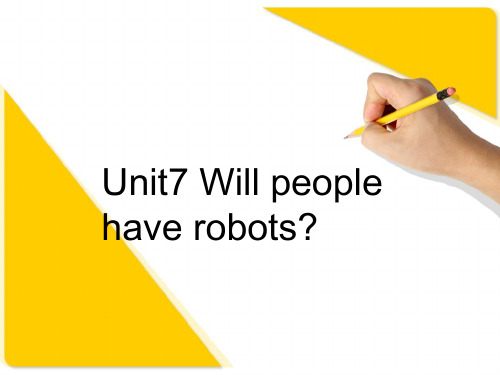
What do you want to be when you grow up?
S: I want to be a scientist. T: How are you going to do that?
S: I’m going to study science hard.….
2. I think every home will have a robot. 这是一个含有宾语从句的主从复合句,I think为主句, every home will have a robot 是宾语从句,用来表述自己 的看法。 e.g. I think the boy will buy a few new books about English.
(2012.江苏扬州)---Why are you in such a hurry, John? ---There ____ A a basketball match between Class Three and our class in ten minutes. A. is going to be C. will have B. is going to have D. will hold
拓展:根据语法的惯例,I think/suppose/believe等后的宾语 从句如果是否定句,要把否定转移到主句的动词上,这种 现象称之为“否定转移”。 e.g. I don't think he can swim.
I don't think you can go there by bus.
思考:其反意疑问句的变法
做我们能做的事情 养鸟 看起来没有那么漂亮
度假
人教版英语七年级上册单元知识点Unit 7 知识点

Unit 7 How much are these socks?一.重点单词:clothes, socks, T-shirt, shorts, sweater, trousers, shoes, skirt, dollar, big, small, short, long 二.短语归纳:how much 多少钱seven dollars 七美元white bag 白色的包clothes store 服装店at very good prices 以很低的价格for boys 对于男孩子skirts in red 红色的裙子twenty-eight dollars 28美元Big Sale! 大降价!twenty yuan 二十元a pair of black shoes 一双黑色的鞋子三.重点句型:—How much is/are …? ……多少钱?—It’s /They’re … 它/它们……I’ll take it. 我买了。
in+颜色某种颜色的衣服What color do you want? 你想要什么颜色的?buy sth from sb. 从某人那买某物sell sth to sb. 把某物卖给某人Here you are. 给你。
need doing sth需要被做need to do sth 需要做某事buy sb sth = buy sth for sb给某人买某物sell sb sth = sell sth to sb 卖某物给某人help sb with sth 帮助某人做某事help oneself (to) 自便,随便(吃/喝……)can’t help doing sth. 忍不住做某事四.典句必背:—How much is the hat? 这顶帽子多少钱?—It’s five dollars. 5美元。
—How much are these socks? 这双短袜多少钱?—They’re two dollars. 两美元。
七年级上册unit7 单词表

七年级上册unit7 单词表Unit7. How much are these socks?much /mʌtʃ/ pron.&adj. 许多;大量;多少How much...? (购物时)......多少钱?sock /sɔk/ n. 短袜T-shirt /'ti:ʃə:t/ n. T恤衫shorts /ʃɔ:ts/ n. (pl.) 短裤sweater /'swetə/ n. 毛衣trousers /'trauzəz/ n. (pl.) 裤子shoe /ʃu:/ n. 鞋skirt /skə:t/ n. 裙子dollar /'dɔlə/ n. 元(美国、等国的货币符号为$) big /big/ adj. 大的;大号的small /smɔ:l/ adj. 小的;小号的short /ʃɔ:t/ adj. 短的;矮的long /lɔ:ŋ/ adj. 长的woman /'wumən/ n. 女子Can I help you? 我能帮您吗?need /ni:d/ v. 需要look /luk/ v. 看;看上去pair /peə/ n. 一双;一对take /teik/ v. 买下;拿;取Here you are. 给你。
ten /ten/ num. 十eleven /i'levən/ num. 十一twelve /twelv/ num. 十二thirteen /θə:'ti:n/ num. 十三fifteen /fif'ti:n/ num. 十五eighteen /ei'ti:n/ num. 十八twenty /'twenti/ num. 二十thirty /'θə:ti/ num. 三十Mr. /'mistə/ 先生clothes /kləuðz/ n. (pl.)衣服;服装store /stɔ:/ n. 商店buy /bai/ v. 购买;买sale /seil/ n. 特价销售;出售sell /sel/ v. 出售;销售;卖all /ɔ:l/ adj. 所有的;全部的very /'veri/ adv. 很;非常price /prais/ n. 价格boy /bɔi/ n. 男孩a pair of 一双。
Unit 7
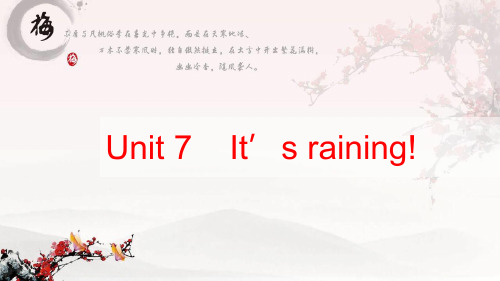
3. I like
Russia(俄罗斯).
music very much. Because my mother is from
Ⅲ. 从方框中选词并用其适当形式填空
rain, Russia, winter, snow
1. In winter, the weather in Moscow is —It’s and cold.
2. —What’s the weather like in Shanghai in summer?
and wet.
?
—
John
.
答案: Who’s that; This is; speaking
how引导的特殊疑问句 【观察领悟】 仔细观察例句, 体会how的用法。 1. How is the weather in Beijing? (how引导的特殊疑问句可以用来询问 )
2. —How is your father? —He is fine.
问题。
【归纳拓展】表示赞同的常见句型:
(1)Sure. /Certainly. /Of course. 当然可以。
(2)That’s correct. 正确。
(3)All right. 好的。
(4)I agree. 我赞同。
(5)That’s a good idea. 好主意。 (6)Yes, I think so. 是的, 我认为是这样。
【归纳拓展】打电话常用交际用语 Who’s that? 你是哪一位? Is that. . . speaking? 你是„„吗?
This is. . . speaking. 我是„„。
I’m afraid he/she isn’t in right now.
人教版七年级下册units7-8核心考点归纳(语法+词汇+短语+重点句子)

人教版七年级下册unit7+8核心考点及语法归纳【unit 7语法】现在进行时:(一)基本用法:(1)表示(说话瞬间)正在进行或发生的动作。
(2)也可表示当前一段时间内的活动或现阶段正在进行的动作。
(二)谓语构成:be (am/ is/ are)+v-ing (动词的现在分词)例如:I’m watching TV now.我现在正在看电视They’re playing football.他们正在踢足球(三)现在分词的构成。
(1)一般情况下在动词词尾加ing。
go→going ask →asking look→looking(2)以不发音的e结尾的动词,去掉e加ing。
have →having take→taking make→making write→writing (3)以一个辅音字母结尾的重读闭音节,双写最后一个字母,再加-ing。
get→getting sit→sitting put→putting run→runningswim→swimming begin→beginning shop→shopping(四)现在进行时态的肯定式、否定式、疑问式及简略回答。
(1)肯定式:be+v-ingShe is singing in the next room. 她正在旁边教室唱歌(2)否定式:be+not+v-ingThe students aren’t cleaning the classroom.学生们没有在打扫教室(3)一般问句:be动词提前。
肯定答语Yes,主语+be,否定答语No,主语+be not。
--Are you playing the computer game? 你在打电脑游戏吗?--Yes, I am. /No, I am not.(4)特殊问句:对谓语动词进行提问的:What+be +主语+doing+其他?What is the old man doing under the tree? 这个老人在树下做什么?对其他成份进行提问的,疑问词+一般疑问句?Where is the boy swimming? 这个男孩在哪里游泳?Who is she waiting for?她在等谁?现在进行时与一般现在时的区别(一)现在进行时表示动作正在进行,是暂时性的,而一般现在时表示动作的习惯性和经常性I am am cleaning my room now. (暂时性)I clean my room every day. (经常性)(二)现在进行时可表示短暂性动作,而一般现在时表示长久性动作。
Unit 7 要点整理答案
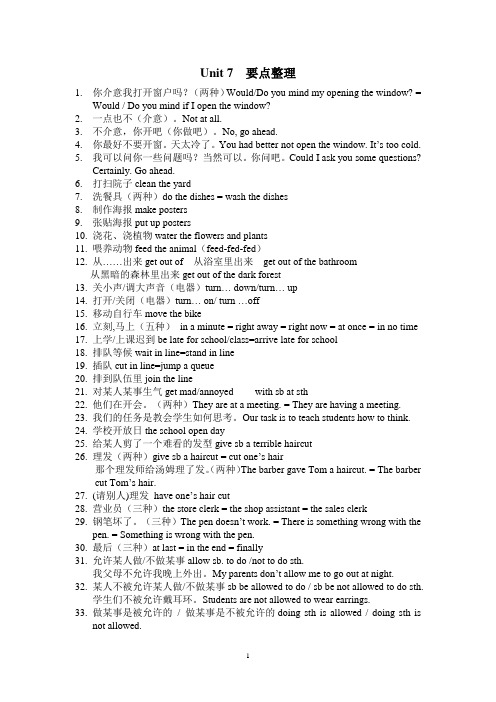
Unit 7 要点整理1.你介意我打开窗户吗?(两种)Would/Do you mind my opening the window? =Would / Do you mind if I open the window?2.一点也不(介意)。
Not at all.3.不介意,你开吧(你做吧)。
No, go ahead.4.你最好不要开窗。
天太冷了。
You had better not open the window. It’s too cold.5.我可以问你一些问题吗?当然可以。
你问吧。
Could I ask you some questions?Certainly. Go ahead.6.打扫院子clean the yard7.洗餐具(两种)do the dishes = wash the dishes8.制作海报make posters9.张贴海报put up posters10.浇花、浇植物water the flowers and plants11.喂养动物feed the animal(feed-fed-fed)12.从……出来get out of 从浴室里出来get out of the bathroom从黑暗的森林里出来get out of the dark forest13.关小声/调大声音(电器)turn… down/turn… up14.打开/关闭(电器)turn… on/ turn …off15.移动自行车move the bike16.立刻,马上(五种)in a minute = right away = right now = at once = in no time17.上学/上课迟到be late for school/class=arrive late for school18.排队等候wait in line=stand in line19.插队cut in line=jump a queue20.排到队伍里join the line21.对某人某事生气get mad/annoyed with sb at sth22.他们在开会。
Unit 7中文翻译
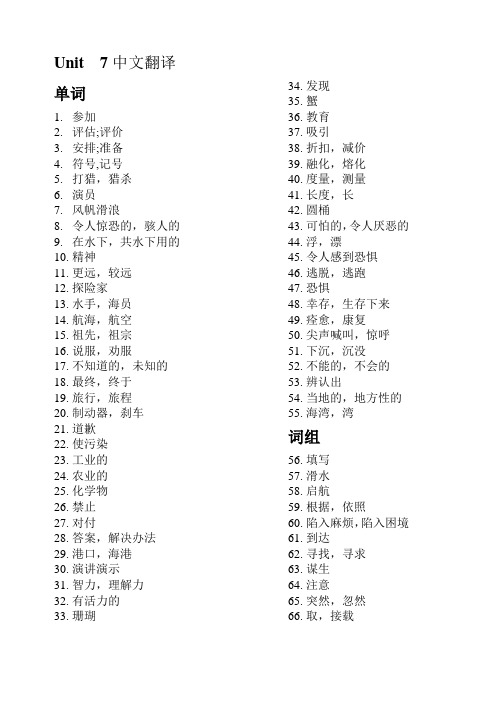
Unit 7中文翻译
单词
1.参加
2.评估;评价
3.安排;准备
4.符号,记号
5.打猎,猎杀
6.演员
7.风帆滑浪
8.令人惊恐的,骇人的
9.在水下,共水下用的
10.精神
11.更远,较远
12.探险家
13.水手,海员
14.航海,航空
15.祖先,祖宗
16.说服,劝服
17.不知道的,未知的
18.最终,终于
19.旅行,旅程
20.制动器,刹车
21.道歉
22.使污染
23.工业的
24.农业的
25.化学物
26.禁止
27.对付
28.答案,解决办法
29.港口,海港
30.演讲演示
31.智力,理解力
32.有活力的
33.珊瑚34.发现
35.蟹
36.教育
37.吸引
38.折扣,减价
39.融化,熔化
40.度量,测量
41.长度,长
42.圆桶
43.可怕的,令人厌恶的
44.浮,漂
45.令人感到恐惧
46.逃脱,逃跑
47.恐惧
48.幸存,生存下来
49.痊愈,康复
50.尖声喊叫,惊呼
51.下沉,沉没
52.不能的,不会的
53.辨认出
54.当地的,地方性的
55.海湾,湾
词组
56.填写
57.滑水
58.启航
59.根据,依照
60.陷入麻烦,陷入困境
61.到达
62.寻找,寻求
63.谋生
64.注意
65.突然,忽然
66.取,接载。
- 1、下载文档前请自行甄别文档内容的完整性,平台不提供额外的编辑、内容补充、找答案等附加服务。
- 2、"仅部分预览"的文档,不可在线预览部分如存在完整性等问题,可反馈申请退款(可完整预览的文档不适用该条件!)。
- 3、如文档侵犯您的权益,请联系客服反馈,我们会尽快为您处理(人工客服工作时间:9:00-18:30)。
Unit 7 Why do you like pandas?【单元话题】动物园动物(Animals in a zoo)【学习目标】1. 能描述各种常见的动物(Describe animals)Panadas are kind of interesting.Lions are scary.2. 能表达自己对动物的喜好(Express preferences)A: Why do you like tigers? B. Because they’re really cool.重点词汇:熊猫_____________动物园___________ 老虎____________ 象征_________大象__________ 狮子____________长颈鹿________________动物___________可爱的;机灵的___________懒散的;懒惰的______________ 宠物_______________美丽的_____________吓人的;恐怖的_____________睡觉____________ 友好的______________ 腼腆的______________稍微;有点儿______________ 澳大利亚_____________________保持;保留________由....制成___________________迷路_________________砍倒__________________处于(极大)危险之中_________________________ 忘记;遗忘______________词汇精讲1. kind(1)kind 作可数名词,意为“种类,类别,类型”,常与of连用构成短语,常见的有:a kind of (一种); different kinds of (不同种类的);all kinds of (各种各样的); 这些短语后可以接不可数名词或可数名词的单数或复数。
例:The supermarket sells all kinds of goods. 超市出售各种各样的商品。
(2)kind 形容词,“友好的,善良的”,be kind to sb. 表示“对某人(友)好。
例:Our teacher is kind to us. 我们老师对我们很好。
(3)kind of 是非常口语化的表达方式,意为“有点儿,稍微”,用来修饰形容词。
相当于a little/bit, 也可以单独使用。
例:She is kind of shy. 她有点害羞。
2. save(1)save 动词,意为“拯救,救助”,后接名词或者代词作宾语。
save one’s life意为“挽救某人的生命”。
例:He saved the boy’s life.(2)save 还可意为“储蓄,储存”。
例:He saved a lot of money to buy a house.(3)save 还可以意为“节约,节省”。
例:Please_______________________. 请节约用水。
3. danger(1)danger 名词,意为“危险”,be in (great) danger 意为“处于(极大地)危险中”;out of danger 意为“脱离危险”。
例:We must save the animals in great danger.(2)danger 的形容词是dangerous, 意为“危险的”,反义词是safe,“安全的”4. cut(1)cut 动词,意为“砍,切”,只用带刃儿的工具将物体分开,可以接简单的宾语也可以接双宾语,其间接宾语也可以转化成介词for的宾语。
例:Please cut Lily the cake. = Please cut the cake for Lily.请帮莉莉切蛋糕。
(2)cut down 固定词组,意为“砍倒”,指自根基部分砍倒某物。
Cut down 还可表示“削减;缩小(尺寸或数量)”,后接介词to或on构成的短语。
例:People should stop cutting down so many trees.5. over(1)over 为介词,有“超过,多于”的含义,相当于more than。
例:There are over 50 students in our class.(2)over作介词还可以表示“在……上方”。
例:There is a bridge over the river.(3)over作副词,表示“完了,结束”。
常作表语。
例:Class is over. 下课了。
(4)常见的over构成的短语有:go over 检查all over 遍及,整个over and over 反复over there 在那边6. lost(1)lost 作为形容词,意为“走失的,迷路的,失散的”或者“丢失的,遗失的”;常与系动词be或者get连用,表示“丢失,走失,迷路”。
“get lost”表示“迷路时”相当于lose one’s way。
例:The boy got lost. = The boy____________________.那个男孩迷路了。
(2)lost经常用于名词前作定语修饰名词。
例:a lost child 走丢了的孩子 a lost watch 被人遗失的手表(3)lost 的动词原形lose意为:“遗失; 失去”,lose one’s home “失去家园”例:The flood(洪水)made thousands of people lose their homes.词汇精炼I. 根据句意和首字母提示补全单词。
1. This is my f___________ journey by air. How excited I am!2. She is a b___________ girl with golden hair.3. The p____________ like eating bamboo and they’re black and white.4. I want to see monkeys because they’re k_________ of cute.5. People can’t live without w_____________.6. Let’s s____________ the animals in great danger.7. There are o____________ 2,000 students in our school.II. 用括号中所给单词的适当形式填空。
1. Her____________ (friend) are very __________ (friend) to us.2. Don’t let ___________ (he) stand over there, please.3. It’s ____________ (danger) to play soccer in the busy street.4. I think elephants are ______ (interest) animals.5. Mr. Brown has two ____________ (child).6. Let him___________ (go) to the zoo with us, will you?7. Does the lions live in ___________ ( African)?8. Don’t forget ____________ (practice) playing the guitar.III. 选词填空。
从括号中选择适当的词填在横线上。
1. A panda is __________ animal, and the lion is ________ cute. (kind of, a kind of)2. She doesn’t like tigers because they are __________ (cute, scary).3. Lucy, a _____________(13 years old, 13-year-old) girl, is my new pen pal.4. Don’t ______________(cut off, cut down)so many trees.5. Remember ____________ (bring, to bring) your pens next time.句式精讲1. Why do you like pandas?(1)本句是why引导的特殊疑问句,用来询问原因;它的句式是“Why + be动词/ 情态动词/ 助动词+ 主语+ 动词?”。
意为“为什么做……”。
这个句式常用because引导的句子来回答。
because是连词,表示直接的理由。
例:-_______________________________?你为什么学英语-Because it’s important. 因为它很重要。
(2)why还可以表示建议,常用于句型“Why not + do sth.?或Why don’tyou + do sth.?”意为“为什么不……?”。
例:Why not go out for a walk? = Why __________________ go out for a walk? 2. We must save the trees and not buy things made of ivory.(1)made是make 的过去分词,made of ivory意为“由象牙做成的”在句子中做后置定语修饰things。
(2)be made of 意为“由……制成”,从制成品能看出原材料。
例:The kite is made of paper. 这个风筝是用纸做的。
3. Isn’t she beautiful?(1)本句是一个否定疑问句。
否定疑问句通常以be动词、情态动词或助动词与not的缩写形式开头,意思是“难道…不…吗?”,可以表示说话者惊异的情绪、责难的口吻或赞叹;也可以表示说话者的某种建议、邀请或者看法等。
例:Aren’t you an American? 难道你不是个美国人吗?______________________________? 你难道不会踢足球吗?(2)否定疑问句的回答与一般疑问句的回答一样,凡是与事实相符的用Yes,不相符的用No。
但在翻译时,要将Yes 译作“不”,将No译作“是的”;这一点和汉语不同。
